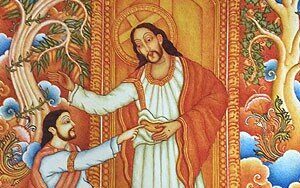For us Orthodox, yesterday was “Thomas Sunday,” the day we hear the passage in the Gospel of John about Thomas’s skepticism (John 20:24-29).

I have maybe a different take on it, because among my college friends were brothers who were identical twins. They could pass for each other easily, and play pranks.
But then one of the twins was in a car crash, and got a scar on his face. “Identical” was over with—now you could tell at a glance which twin was which.
So think about the fact that “Thomas” means “twin” in Hebrew. (And I always wondered, what did they call his brother?)
Thomas might have been *very* familiar with the fact that one person can be mistaken for another. A way to make certain is to check for scars.
After all, Jesus had said, “If anyone says to you, ‘Here is the Christ,’ do not believe it” (Matthew 24:23). Thomas must have felt he was the only one keeping his head when everyone else was going nuts.
“Unless I see the marks of the nail” is a reasonable thing for a twin to say! It’s not evidence that he was an entrenched doubter. It’s no more doubting than the reaction all the apostles had at first, when they waved away the women’s testimony, calling it “idle tales” (Luke 24:11). Thomas, like the others, believed when he saw the risen Christ.
What is the rest of his story? The apostles separated to preach the gospel in different lands, and Thomas went to the south of India, and was martyred there in 52 AD. There has been indigenous Christian faith in India since the first century. And to Indian Christians, Thomas isn’t a “doubter” at all! He is the heroic witness who stood by his faith in Christ even to the death.
(An elderly man told me some time ago that he was in India in 1952, when Christians there held a festival in Thomas’s honor. They had a parade that included 52 elephants.)
My wise spiritual father (perhaps a saint), Fr George Calciu, used to say that Thomas may have been the most brave of the apostles. When Jesus said he was returning to Judea to go to the home of Lazarus, Thomas said, “Let us also go that we may die with him.” (John 11:16).
(Compare that noble word with Ss John and James, who asked Christ to let them sit on his right and left in glory, Matthew 10:37).
And, he said, maybe the reason Thomas was absent, when the others were “hiding for fear of the Jews,” was that he had gone out to buy food to sustain them, or to see if he could hear any news.
At Vespers on the night before Thomas Sunday we sing:
“Marvel at this miraculous paradox: John rested his head on the chest of the Logos, and Thomas was allowed to touch His side. But while the one imbibes God’s eternal plan from that ocean of theology mystically, the other is compelled to disclose the mystery to us openly, as he exposes the proofs of the Lord’s resurrection, and he cries aloud, ‘My Lord and my God, glory to You!’”
Something I just learned about the name “Thomas”—it’s supposed to be pronounced with a “th” sound. Both Hebrew and Greek have that sound, but if you grow up in a language that doesn’t have it, it’s very hard to pronounce. French doesn’t have a “th”, and they tend to substitute a hard “t”. Her’s what I learned:
«The th- spelling is organic, the initial letter of the name in the Greek New Testament being a theta. The English pronunciation as t rather than th- is the result of French influence from an early date.»
Perhaps it goes back to 1066, when the Norman French conquered England. Many French words came into the English language then. They were the rulers and the English were the laborers, as we see in the fact that the terms for meat on the table are French—boeuf (beef), veau (veal), jambon (ham), mouton (mutton)—but the animal in the field is English: cow, calf, pig, sheep.
They pronounce Thomas as “Tomas,” and perhaps the early point that change came into English goes back that far.
Well I certainly have rambled around today!

Fresh and new! Thomas released from doubting cliche. And he's the bravest, the most courageous. I've read a little of your Jesus prayer book and now three of your journal entries, including the eerie dream one. And the St. Pat's breastplate. You in your dream at the window breathe in the death as a natural ending of individual life and going into "the all" to come. There's something past the gunshot that kills us or the beheading or the car crash or the cancer or the bomb or the AR 15 spray. Yes protect us from all that but be willing to accept it anyway. From whose bourne no traveller returns. The lady on tv breathes her last from the virus while her daughter holds her. You feel and show all this. You at the window in your dream feeling your molecules part of the stars. Your St. Pats entry kept reminding me of Macbeth's situation, inescapable horror. "I have supped full of horrors." You stand at the window with open heart and lungs. Destruction is coming but it's the way out. Just have to experience it. Know it. I'm not at all clear what I'm trying to say, but I really feel your writing.
Thank you Frederica. These are pretty much all new facts about Th(!)omas that I did not know before. They are all interesting, and help me love this saint more. Please do more of this sort of (learned) 'rambling'!